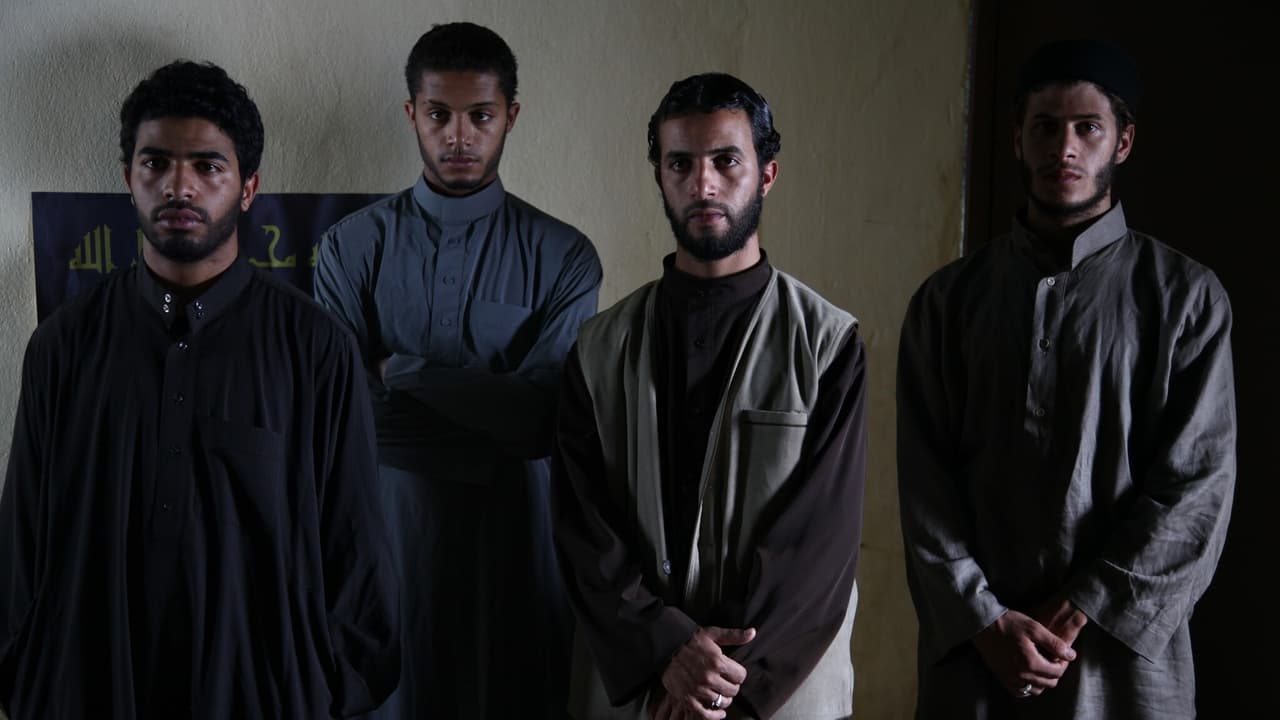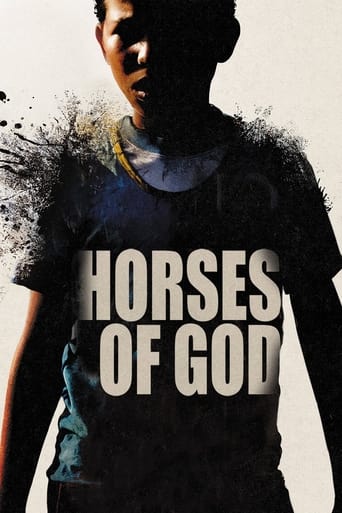

Based on the real multiple bombings that took place on May 16, 2003 in Casablanca, Morocco, the film follows its main characters over a period of 10 years, as they transition from boys to young men. There's a lot that's powerful here, and there is much that has the ring of truth in this journey into darkness. But compared to (for example), Hany Abu-Assad's more complex and richer 'Paradise Now' there's also something a bit schematic. The reasons behind the transformation of these once sweet young men into bombers– poverty, hopelessness, an overly macho culture – are certainly true, but they're also familiar. It doesn't quite feel like we're digging deeper into their souls.I also wish the villains of the piece, both Jihadist and 'civilian' were a little less on-the-nose, a little less mustache twirling. In terms of those men who are recruiting the boys, I missed the charisma that I assume must be part of the recruitment process.Much like Ayouch's earlier 'Ali Zoaua: Price of the Streets', also about middle -eastern street kids, while the film is intelligent and interesting, it feels like it should be even more emotionally devastating than it ultimately is. That said, it's good enough that I could imagine re-visiting it, and seeing if it pulls me in even deeper on a second viewing.
... View MoreA difficult film to review objectively because of the content. It was extremely well done whatever your reaction might be to the story that was told. For those open to the excellent message contained in this film, it would be well worthwhile to watch. To those who see the world solely in black & white, it may, unfortunately, further fuel their prejudicesThe story begins with a group of boys born and raised in the squalor of a Moroccan slum. Their lives are shaped by poverty, exploitation within their own community, harassment by the police and indifference to their plight from the government. They develop into young men who have little hope for the future, who use & deal drugs, who get drunk and into fights, who commit crimes & have no hope of meaningful employment, who are harassed & exploited by the police, and who in some cases are put in prison.At this point in the story some of the young men are rescued ( or further exploited, depending on your point of view) by a group of Muslim men. The young men become part of a community that support & care for one another, pray & receive religious instruction, stop their anti-social behavior, cease committing petty crimes and seem on the road to being model citizens.But then their education goes beyond the fundamentals of Islam and they learn of the persecution of others of their faith around the world. They are trained in hand to hand combat and indoctrinated with the view that martyrdom for the faith and for the defense of their people is an honorable objective that will ensure their entry into paradise and provide comfort to their families in this life.To western minds this would appear to be mindless extremism and sacrifice but to be fair virtually every nation and every ideology fights its battles with armies recruited from poor, under-educated young men who have few prospects for the good life experienced by those who want to use them to defend their comfortable status quo or who want them to sacrifice themselves for some cause from which they, the recruiters, would reap the rewards. Whether the exploiters glorify the prospect of an honorable death for king & country, for democracy, for democratic freedom or for religious survival, it amounts to the same thing attracting the disenfranchised through propaganda and short-term rewards to fight and die while those who reap the potential benefits stay out of harm's way.The message of the film may help some to better understand the circumstances that inspire the recruitment of Islamic fundamentalists who are willing to become martyrs for their faith, but more generally it should open some eyes to the exploitation of marginalized, disaffected people for some "grand cause," whether it is supposedly to preserve a western capitalistic way of life (though certainly not a life enjoyed by most of those recruited) or to restore lost glory (as was twice the case in Germany) or supposedly at the behest of the semi-divine emperor of Japan or to defend the faith as in the crusades or Israeli conflicts and so on throughout history. Glorifying sacrifice from those who have little to lose, by those who have much to gain, is neither unique to Islamic fundamentalists nor to the 21st century. The conditions that produce the ready supply of recruits used to wage wars and terrorism are nothing new either.Definitely a thought-provoking, well produced film.
... View MoreThe movie takes us into the slums of Morocco and follows a young man, Hamid, as he experiences life under rather abominable conditions. He struggles to make sense of his life and to make a little money for his family. He sells oranges on the street and is harassed and driven out by thugs who want a split of his profits. He goes to work for an abusive, alcoholic mechanic while his drug dealing brother goes to jail. When not working Hamid and his friends sit around smoking dope. He like a local girl, but the chance of ever getting her are little better than zero. The entire ambiance of the slum is beautifully rendered, you feel you're really there with the dust and the heat and the feeling of hopelessness. His brother comes back from jail a changed man. He has become a Serious Muslim.Hamid, is recruited by Muslims into their group. At first he's skeptical, but because they help him out of a serious jam, and because they represent discipline and friendship he is gradually won over to their cause. You can see clearly the attraction of these Muslim fellowships for young guys who have little hope in the slums. To this point everything is perfectly clear. You understand the Hanid's motivations. He finds a home among the strict, observant Muslims. Of course there's a lot of extremist propaganda too, served along with the camaraderie. They show videos of Osama bin Laden and jihadis training for jihad. But at this point in the film we experience a sudden and bizarre turn of events. Well, not so surprising considering we know that such things occur too often in the real world, but bizarre and sudden in terms of the psychology of the characters. A handful, including Hamid, are chosen to become suicide bombers and they go willingly and without question to their deaths. This is of course the enigma of the suicide bomber. No other religion encourages their followers to blow themselves up for religious reasons. There is something intensely insane in the way Islam is practiced in those countries. The young men are being asked to blow up bars and nightclubs frequented by Europeans in order to kill innocent civilians. The fact that the Europeans have nothing to do with the conditions they have to live under in the slums, or that killing them could have any practical effect on improving conditions, is never considered by either the guys who give the orders or by the selected bombers themselves. Obviously the situation of the suicide bombers is not at all like the Kamikazes, who sacrificed themselves in a battle where their deaths could make an actual difference. Perhaps these young men actually believe that they'll go to Paradise and have lots of girlfriends. Perhaps their material and cultural context is so impoverished they come to prefer death over life.. The movie does not take sides in this. It is a crazy situation for which, ultimately, there is no explanation. Without flinching or editorializing the film just shows what actually happens and it is up to up to make sense of it. Or no sense. Since it makes no sense we are left with the enigma.
... View MoreThe terrorist bombings in the Moroccan city of Casablanca didn't get as much attention as those in New York, London or Madrid. The five attacks were aimed at western and Jewish targets, killed 45 people, and were carried out by Moroccans, all of them young men from Sidi Moumen, a nearby slum. The attacks came as a shock, because for an Arab country, Morocco is considered rather moderate and open-minded. So why did these young terrorists carry out such gruesome attacks in their own city? The film 'Le chevaux de Dieu' (God's Horses) tries to answer that question, and does it in an impressive way. For the most part, the film shows the daily life of young men in the slums. It is a cruel environment, an urban jungle full of violence, drugs, alcohol, corruption and extortion. And above all: without any hope. It is this desperate life that provides the fertile ground for frustration and rebellion. The film shows clearly that the young men at no point deliberately choose for Muslim fundamentalism. One of them is arrested for throwing a stone to a police car and returns from prison as a faithful Muslim. Another kills his boss to prevent a rape, and is told by the religious community that God forgives him, provided that he starts praying and believing in Allah. For the young slum dwellers, faith and religion is a tempting way of life. It preaches forgiveness, whereas the slum is full of violence. It is clear and deliberate, not chaotic like slum life. Its most important feature is discipline, which is in stark contrast with the loose morals in the slum dwellings. The young men are fascinated by the Muslim organization. Slowly their lives are getting controlled by it. When the leader tells them they are selected for a special assignment, they feel honoured. Even when it becomes clear what this assignment is, most of them don't hesitate for a second. The film doesn't approve of Muslim fundamentalism in any way. It merely shows the mechanics of it. That's why it is such a good movie. Watching the young men being absorbed by their religion, you almost pity them. But most of all, you understand why they do what they do. That's more than most other post-9/11 films have accomplished. Moreover, the acting is incredibly subtle, and the cinematography is so effective that, at the end of the film you think you know the Sidi Moumen neighbourhood really well. When you go watch the movie, pay attention to the last shot; it is a beauty. In an amazing traveling shot, the camera circles around a group of kids playing football in the slums and watching the fatal explosion in the distance. Then, without cutting, the camera pans towards a cliff, we see the ball falling down and disappearing in the darkness. 'Le chevaux de Dieu' is a gem, and it would be a pity if it stays unnoticed by western audiences.
... View More